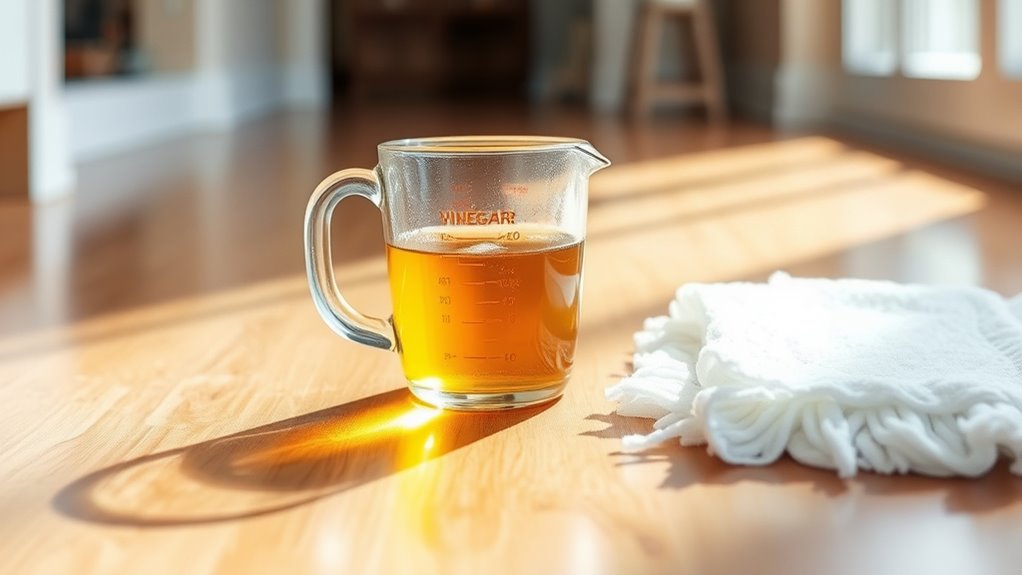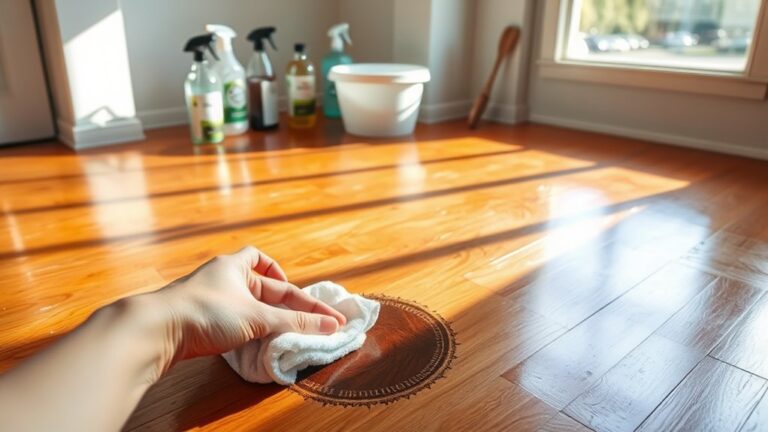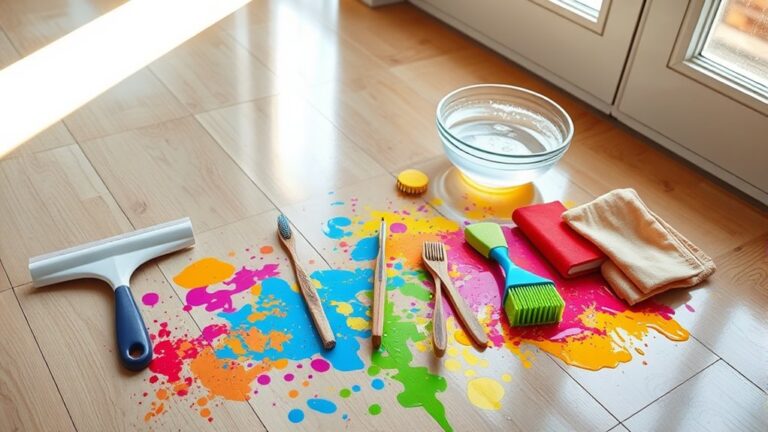You should use about ½ to 1 cup of vinegar per gallon of water to clean most floors effectively and safely. For hardwood, dilute more—around 1 part vinegar to 10 parts water—to protect the wood. Tile and vinyl can handle 1 cup per gallon, while avoid vinegar entirely on natural stone to prevent damage. Adjust the ratio depending on piso type and sensitivity. Keep this in mind, and you’ll find key tips to optimize your vinegar cleaning routine ahead.
Benefits of Using Vinegar for Floor Cleaning
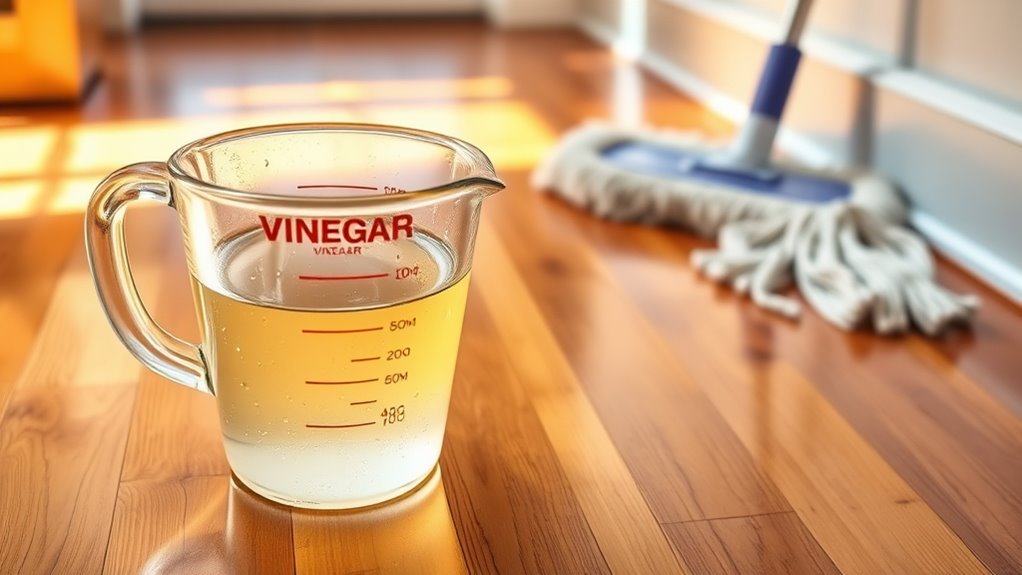
Although you might not realize it, using vinegar for floor cleaning offers several significant benefits. It’s a powerful, natural disinfectant that kills bacteria without harsh chemicals, making it a smart choice for eco friendly cleaning. Unlike many vinegar alternatives that can be costly or contain synthetic ingredients, vinegar is affordable, readily available, and non-toxic. You get the freedom to clean effectively while protecting your family and the environment. Vinegar’s acidic nature breaks down dirt and grime with ease, eliminating the need for multiple products. Plus, it leaves no harmful residue, so your floors stay clean and safe. Choosing vinegar means embracing simplicity and sustainability, freeing you from dependence on complex, chemical-laden cleaners. It’s a practical, eco-conscious way to maintain your floors every day.
Ideal Vinegar-to-Water Ratios for Different Floor Types
Because different floor materials react uniquely to vinegar’s acidity, using the right vinegar-to-water ratio is essential to avoid damage while ensuring effective cleaning. For tile and vinyl floors, a stronger mix of 1 cup vinegar to 1 gallon of water works well, maximizing vinegar benefits without risking harm. Laminate floors require a gentler approach—try ½ cup vinegar per gallon of water to protect the surface. For stone floors, avoid vinegar altogether since its acidity can etch the surface; consider other cleaning alternatives instead. By adjusting the ratio based on your floor type, you maintain freedom in choosing natural, cost-effective cleaning solutions while preserving your floors’ integrity. This precision helps you harness vinegar’s power safely and efficiently every time you clean.
How to Clean Hardwood Floors With Vinegar
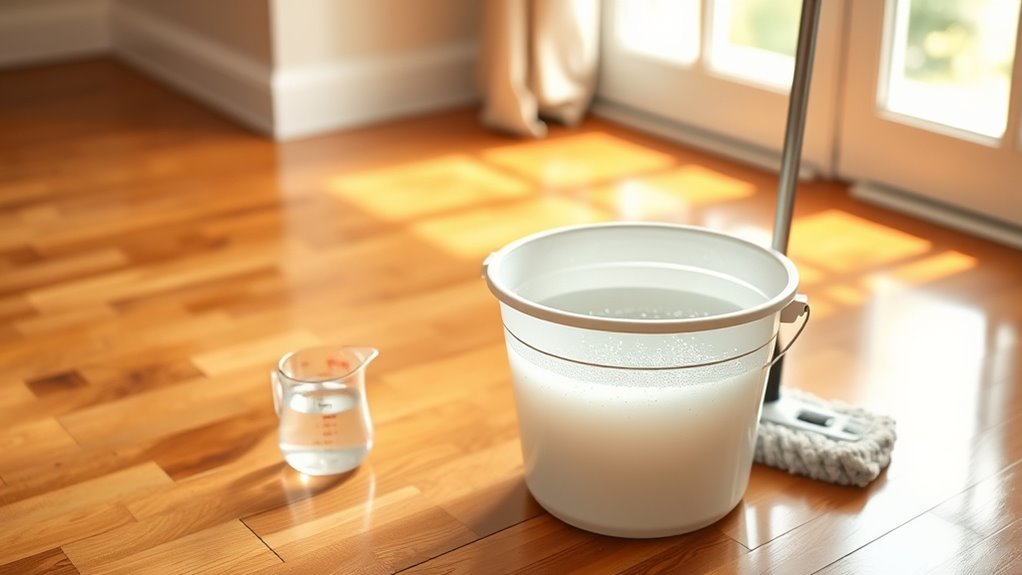
To clean hardwood floors with vinegar, mix one part vinegar with ten parts water to avoid damaging the wood. Use a damp mop rather than soaking the floor to prevent excess moisture. Always test a small area first and guarantee proper ventilation for safety.
Vinegar-to-Water Ratio
When cleaning hardwood floors with vinegar, the right vinegar-to-water ratio is crucial to protect the wood while effectively removing dirt. Using the proper balance guarantees you get vinegar benefits like natural disinfecting and residue-free shine without damaging your floors. Most cleaning solutions suggest diluting vinegar to reduce its acidity, preserving your hardwood’s finish.
| Vinegar Amount | Water Amount |
|---|---|
| ½ cup | 1 gallon |
| 1/3 cup | 1 gallon |
| ¼ cup | 1 gallon |
For routine cleaning, ½ cup vinegar per gallon of water works well. For sensitive finishes, reduce vinegar to ¼ cup per gallon. Adjust based on your floor’s needs, keeping the solution gentle yet effective.
Application Tips and Safety
Although vinegar is a natural cleaner, you’ll want to take precautions to protect your hardwood floors and confirm safe use. Following the right safety measures and application techniques guarantees effective cleaning without damage.
- Dilute vinegar properly—never use it full strength on hardwood to prevent finish damage.
- Use a damp, not soaked, mop to avoid excess moisture seeping into wood.
- Test a small, hidden area first to check for any adverse reactions.
- Ventilate the room well to minimize vinegar fumes and speed drying time.
Using Vinegar on Tile and Grout Surfaces
How much vinegar should you use on tile and grout surfaces to get the best results? For effective tile cleaning and grout maintenance, mix one cup of white vinegar with a gallon of warm water. This ratio is strong enough to break down dirt and grime without damaging your surfaces. Apply the solution using a mop or sponge, focusing on grout lines where buildup occurs. Let it sit for 5–10 minutes, then scrub grout with a soft brush to lift stains. Rinse thoroughly with clean water to prevent residue. Avoid using vinegar on natural stone tiles, as its acidity can cause etching. By sticking to this precise mixture and method, you’ll maintain clean tile and grout surfaces while preserving their integrity—giving you freedom from harsh chemicals and complicated routines.
Vinegar Solutions for Laminate Flooring
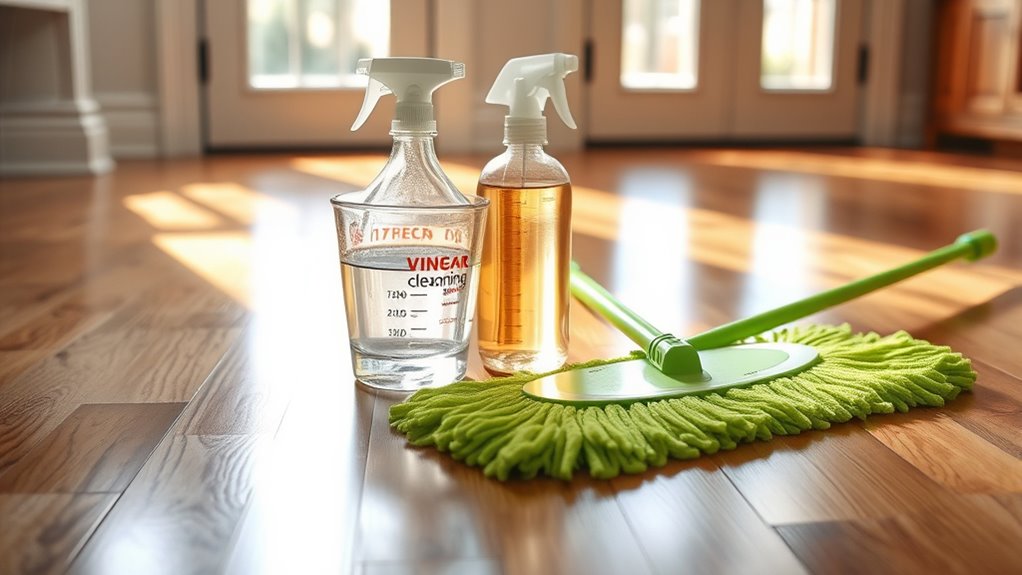
When cleaning laminate floors with vinegar, mix one cup of vinegar with a gallon of warm water to keep it gentle yet effective. You’ll want to use a damp mop rather than soaking the floor to prevent moisture damage. Avoid harsh scrubbing or using undiluted vinegar, as that can wear down the protective layer of your laminate.
Ideal Vinegar-to-Water Ratio
Since laminate flooring is sensitive to moisture, you’ll want to use a diluted vinegar solution to avoid damage. The ideal vinegar-to-water ratio balances cleaning effectiveness with protection. A common mix is 1 cup of white vinegar to 1 gallon of warm water. This concentration cleans well without risking laminate warping or dulling.
Here’s a quick guide to ideal ratios:
- 1 cup vinegar : 1 gallon water – Standard, safe for regular cleaning
- ½ cup vinegar : 1 gallon water – Gentler, for frequent use or sensitive floors
- ¼ cup vinegar : 1 gallon water – Mild, when using vinegar alternatives like lemon juice
- No vinegar – Opt for vinegar alternatives if you prefer less acidity
Stick to these proportions to keep your floors clean and free without compromising their finish.
Técnicas de aplicación segura
Although vinegar solutions are effective for cleaning laminate floors, you’ll need to apply them carefully to prevent moisture damage. Use a well-diluted mix and avoid soaking the floor. Opt for a damp mop rather than a wet one. Consider vinegar alternatives like alcohol-based cleaners for less frequent deep cleans. Adjust cleaning frequency based on foot traffic to maintain freedom from buildup without over-wetting.
| Paso | Acción | Consejo |
|---|---|---|
| 1 | Dilute vinegar (1:10) | Prevents excess moisture |
| 2 | Utilice un trapeador de microfibra | Absorbs liquid efficiently |
| 3 | Avoid standing water | Protects laminate integrity |
| 4 | Alternate with vinegar alternatives | Reduces wear from frequent cleaning |
Following these techniques keeps your floors clean and damage-free.
Avoiding Floor Damage
To avoid damaging your laminate floors with vinegar solutions, you’ll need to use the right dilution and application methods. Laminate flooring isn’t as vinegar-compatible as tile or hardwood, so controlling vinegar concentration is key. Too strong, and you risk stripping the protective finish.
Here’s how to keep your floors safe:
- Dilute vinegar with water at a ratio of 1:10 or weaker to reduce acidity.
- Test the solution on a small, hidden area to check for discoloration or damage.
- Use a damp mop rather than soaking the floor to prevent moisture seeping into seams.
- Avoid vinegar-based cleaners if your laminate manufacturer advises against it, respecting floor compatibility.
Cleaning Vinyl Floors Safely With Vinegar
When cleaning vinyl floors, you’ll want to use a vinegar solution that’s gentle yet effective. Mix one cup of white vinegar with a gallon of warm water to harness vinegar benefits without damaging the surface. This ratio cleans thoroughly while preventing vinyl from dulling or warping. Avoid harsh chemicals and opt for this natural method to maintain your floor’s shine and durability. If vinegar’s scent or acidity concerns you, consider vinegar alternatives like diluted lemon juice or mild dish soap, which also clean well without risking damage. Always mop gently and avoid soaking the floor, as excess moisture can seep into seams. By choosing the right vinegar solution, you keep your vinyl floors spotless and protect your freedom to enjoy a clean, safe home.
Precautions When Using Vinegar on Natural Stone Floors
Since natural stone floors are sensitive to acidic substances, you should avoid using vinegar to clean them. Vinegar’s acidity can etch and dull the surface, damaging your floor’s natural beauty. Instead, opt for pH-neutral cleaning solutions designed specifically for natural stone.
If you still want to proceed, consider these precautions:
- Test any cleaning solution on a small, hidden area first.
- Avoid prolonged contact—wipe spills quickly to prevent damage.
- Dilute vinegar heavily if you must use it, but sparingly.
- Never use abrasive tools or harsh chemicals alongside vinegar on natural stone.
Protecting your natural stone floors means choosing cleaning solutions that respect their sensitive nature, ensuring your freedom to maintain a flawless, lasting finish.
Tips for Enhancing Vinegar Cleaning Solutions
Although vinegar is a powerful cleaner on its own, you can boost its effectiveness by combining it with other natural ingredients or adjusting its concentration. Using vinegar benefits wisely lets you craft versatile cleaning alternatives tailored to your needs. For instance, adding essential oils improves scent and antibacterial power, while adjusting vinegar concentration can target tougher grime.
| Enhancement | Objetivo | How to Use |
|---|---|---|
| Lemon juice | Boosts acidity & scent | Mix 1 cup vinegar + 1/4 cup lemon juice |
| aceites esenciales | Adds fragrance & kills germs | Add 10 drops per gallon of solution |
| Water ratio | Controls strength | Use 1:4 vinegar to water for floors |
Experiment with these tips to enjoy a fresher, more effective cleaning experience.
How Often Should You Clean Floors With Vinegar?
Regularly cleaning your floors with vinegar helps maintain cleanliness without harsh chemicals. To find the right cleaning frequency, consider your lifestyle and floor type to optimize floor maintenance. Here’s a simple guide:
- Zonas de alto tráfico: Clean once a week to manage dirt and grime buildup.
- Low-traffic rooms: Every two weeks is sufficient to keep floors fresh.
- Spills or stains: Address immediately with a quick vinegar wipe to prevent damage.
- Seasonal deep cleaning: Once every few months, do a thorough vinegar mop for deep floor care.
Adjust this schedule based on your household needs. Using vinegar regularly but not excessively preserves your floors’ finish and extends their life, giving you the freedom to enjoy a clean, healthy home without harsh chemicals.

